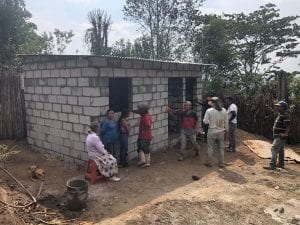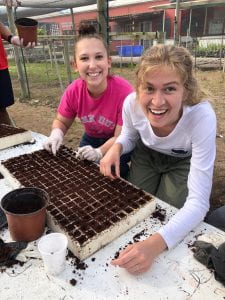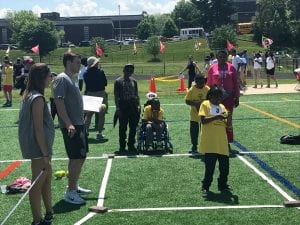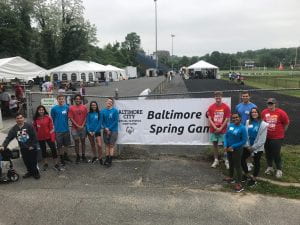My project took me to Arizona where I participated in a Buck-I-Serv service project at the Polatki Heritage Site in Sedona, Arizona. I helped the United States Forest Service preserve and maintain a trail leading up to an old structure built by Native Americans thousands of years ago so that people can observe it for many years to come. I also partook in lots of outdoor activities, including camping, rafting, and backpacking in order to learn about good environmental habits as well as enjoy Arizona’s rich outdoor culture.
This project transformed me in a couple of ways. The biggest transformation I see in myself after leaving Arizona is the need to preserve history for the benefit of others. Assisting the Forest Service with their trail maintenance project made me realize just how important it is to preserve all the historical artifacts we have. If I hadn’t carried buckets of soil up the trail to the site of the structure, the base would have been unstable and may have collapsed within a few years. This would mean the loss of a piece of history that acted as a teaching tool to all who gazed upon it. Looking at the structure, people were given an opportunity to see how others lived thousands of years ago, and can compare it to the way we live today. Without the physical structure, it would be much harder for people to imagine what it would have looked like. However, because of the work I and other students took part in, the structure will be able to stand for many years. As a result of this project, I have gained an interest in preserving historical artifacts and structures. Without these pieces of history, it will be very difficult to learn from the past.
Another transformation I saw in myself is that I have the ability to live a very simple life for an extended period of time. The housing on this trip was camping, aside from one night where we stayed in a hostel. When we camped there were no electrical sockets, no air conditioning or heating, or even beds. I slept in a sleeping bag in tents shared with other trip members. I pushed my limits in this regard because the longest period of time I had ever camped for prior to this trip was 5 days, while this trip lasted 12 days. I was barely on my phone, as I had chores to do around the campsites and was bonding with my fellow Buck-I-Serv trip members. This trip taught me that I can be detached from my phone and even society and still survive. I learned how to cook meals with a little gas stove, a pot of water, and the food that we carried on our backs while we hiked in the Grand Canyon. This simple way of living has further taught me that I do not need large amounts of material possessions to be happy. While on this trip, I essentially only had the necessities, with my phone being the one exception. I am now able to get by with less, which is a good life lesson to learn.
The most important relationships that fostered my development were those that I made with the other students who accompanied me on the trip. We all had to learn how to live in the wild, with just the supplies we brought and our wits about us to help us survive. Doing this with 15 other people helped me because they encouraged each other to stay off their phones and socialize, as well as helped each other get chores done for the day. In addition, we all led by example. By not being on my phone, I was demonstrating to others that we should stay off our phones and enjoy each other’s company. Everyone was doing this by the end of the trip, which allowed us to all better enjoy the trip.
In addition, my relationship with the Forest Service crew taught me the importance of history. While we were working in Sedona at the Polatki Heritage site, we had several lectures on the stone structure we were helping to support with trail materials. We were taught about its construction, what it meant for the inhabitants, and how it separated Native Americans living in Arizona from those living in other parts of the country. These lectures demonstrated to me just how much we can learn from old structures and other artifacts we find. These artifacts help history come alive in my opinion, which is why it is crucial that we preserve as many of them as we can. As the Forest Service preached to us, it is important that we learn from our country’s history so that we pay respect to those who were here before us and honor them by displaying their creations.
Along these lines, the work I completed helped me realize just how difficult and laborious it can be to preserve history. My group and I spent 3 days carrying buckets of soil up and down the trail to the base of the Native American structure. These were 3 very long days. We worked in the heat, with the sun beating down on us, and with bursts of storms and rain. By each day’s end we were all exhausted, but at the same time satisfied with our work. Working in varying conditions for 3 days straight was a tough start to the trip, but it demonstrated just how much work I can do. At the end of our service, we had added 3 inches of material to a lengthy trail at the base of the structure. It was so gratifying seeing the slow yet steady progress we made each day. Although the work was hard, I enjoyed doing it because it fostered my appreciation for history and the need to protect it so that others can learn from it.
These changes are significant to me in two ways. The first way is that I believe I am now better suited to travel to foreign locations. I learned about the history, plants, animals, and ways of life of people in the southwest region while on this trip. This was my first time traveling to the American southwest, and I wasn’t sure what to expect when I arrived. However, thanks to my trip leaders I was able to quickly adjust to the different environment. This is important to me because I love traveling and learning about new cultures, and the ability to not just learn about new places but also feel like you belong there in such a short time is a very unique trait to have. This trip instilled this skill in me and has left me excited to continue traveling and adapting to new regions.
The other significance this trip has is that it has made me aware of the extremely materialistic life I have been leading. While camping in Arizona, I had only the essentials; food, water, clothes, tents, and my phone. My phone was the only piece of technology I brought. Usually, when I go on trips, I pack headphones and my laptop and spend lots of time on them. My STEP project has shown me that I can enjoy a trip without all of these material possessions. While these items may make the trip more “comfortable”, they are not necessary. I barely spent any time on my phone because I was too busy working, or getting to know the students on the trip, or just even having fun. Phones and technology are very helpful in modern society, but they can also take away from certain experiences. I will apply this lesson as I move forward in life, to take my eyes off my phone and be in the moment more. This will allow me to develop better relationships with people and learn more about the world around me.
















